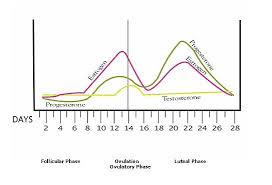Well I certainly am.
I have talked on this blog before about how I regularly track my period and it has helped me to really greatly understand what is and is not normal for my cycle. This is definitely a practice I think everyone should be in as it can really help to manage one’s health and wellbeing. For me, my cycle is relatively normal. About 31 days in length and 3 to 5 days of bleeding. Except this time. As I am sitting and writing this blog post by period is going on day 4 of being late (if we are counting the 31 day average length) and I won’t lie, it’s beginning to freak me out. Is this normal? Should I worry? When should I call my doctor? (And there is a 0% my asexual little booty is pregnant, so don’t even suggest such a thing).
So today, I want to talk about some of these things. Why are periods late? What should we do about it? When is it a late period and when is it a missed period? When should you call the doctor? Let’s really get into the nitty gritty stuff today, guys.
What is the length of a typical menstrual cycle?
The average menstrual cycle is 28 days, but this can vary greatly woman to woman. Typically, a cycle that lasts between 21 and 40 days is considered to be normal. Tracking the period month to month can be extremely helpful for women trying to learn more about their cycle including, length, flow, and symptoms such as cramps and irritability.
When is it a late period and when is it a missed period?
A late period is defined as a period that hasn’t started 5 or more days after you expect it to start, or your usual start for the cycle. So for me, technically my period won’t be late until day 36, so if it starts tomorrow it technically isn’t considered late. A missed period, on the other hand, is a lack of bleeding for 6 or more weeks after the last bleeding cycle.
I’ve read (not that I claim to be ANY kind of expert on the topic), when a period is seven days late, there is a chance that the individual is pregnant. If you have any doubt that you might be pregnant and your period is abnormally late, it might not be a bad idea to tack a pregnancy test to be sure.
Sans pregnancy, what else can cause a late or missed period
Even the most typical cycle can have variations, even unexpected ones, and they don’t always mean pregnancy. Since menstrual cycles are controlled by hormones, fluctuations in hormones can really change the way our body responds.
Things like stress, grief, weight fluctuations (especially rapid), low caloric intake, and intense exercise may be major culprits for changes in menstrual cycles. Some of these are things that we may not even consider, especially if we don’t think we are under more stress than usual or even if we think we are eating enough food.
For me, I think because I have been running every day for 40+ days, my change to the mileage or running I am doing along with a ton of stress from work has really played into my change. I did jump on the scale the other day just to make sure I am maintaining weight, which I am (I’m even up my usual amount surrounding the start of my period).
When should I be concerned?
One or two late period, or even one missed period may not be concerning, especially if things start up again and you begin back on a regular cycle. This might just be worth noting in your app, especially if you can guess what may be causing the change. However, if you cannot pinpoint the cause of your irregular cycle and it is eating away at you, a call to the doctor to have things checked up isn’t a bad idea.
Remember to keep up with your yearly PAP smears too and maybe at your next gyno visit you can mention that your period changed a little.
If things become sporatic, unpredictable, or if you period disappears for several months, it’s definitely time to see a professional. If your irregular periods become normal, it is definitely a time to go see the doctor, and if you don’t have a Gynocologist, it’s time to get recommended to one. Irregular cycles lasting more than six months can be a sign of underlying medical conditions such as endometriosis, polycystic ovarian syndrome (PCOS),
So am I probably freaking out over nothing? Definitely. Is this something I am going to be keeping note of? You bet.
Our menstrual cycle tells us a lot about our health and wellbeing and it is important to pay attention to the signs and symptoms of it just like we would our breathing and our heartbeats.
For me, I’m trying to eat a little bit more and slide back on the intensity of my workouts for a little bit to hope that things begin to calm down and regulate again. In the meantime, I’m also scheduling my gyno appointment because sometimes I don’t practice what I preach and it’s about time I bit the bullet on that one.
Anyway, it you are every concerned about your period, it’s not bad to reach out to your doctor and ask questions! They might take a day or two to get back to you, but having that peace of mind is always good!
Should I go into more details on athletes and the lack of periods in a future post? Let me know if this is something that would interest you in the comments below!
Until next time,
Kat

